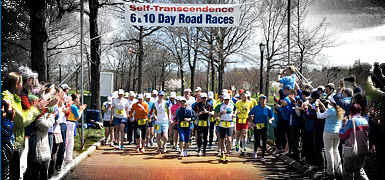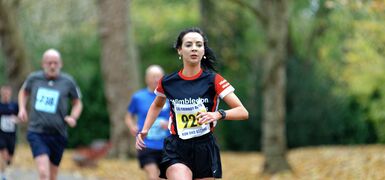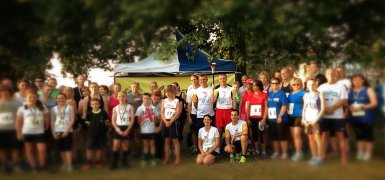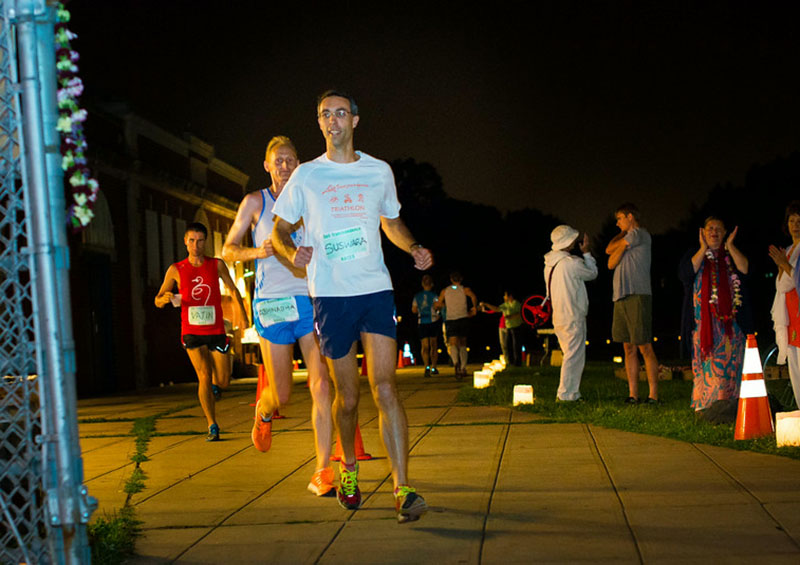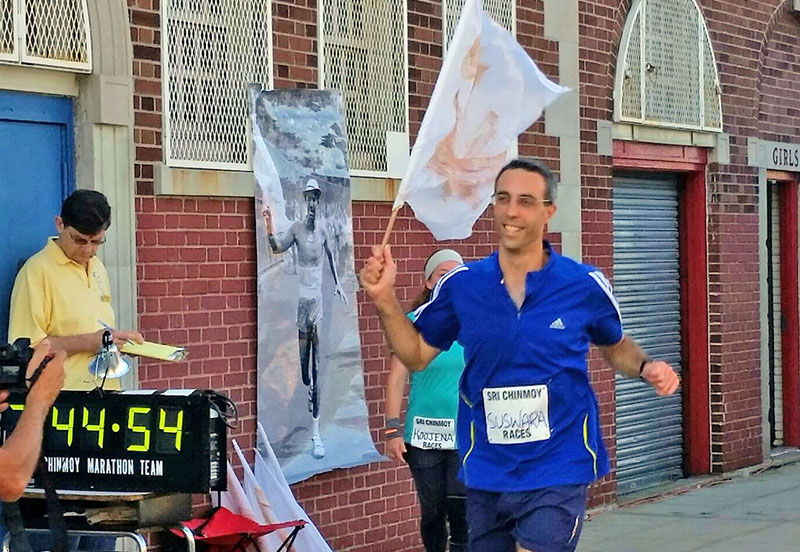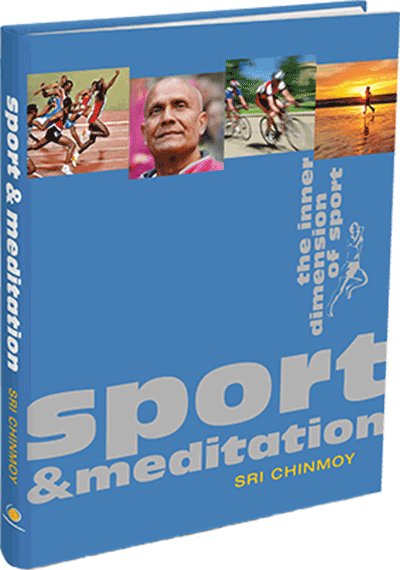I remember my first ultra-run. It was with a group of friends who had decided to run from London to Brighton. Our course was about 50 miles. The furthest I had ever run before that was a marathon. It felt like a big jump - almost double the distance. It was a step into the unknown. I had no idea if I would be able to do it or what I would experience.
I was fortunate that the group contained some experienced ultra-runners who had already covered this kind of distance (and much longer) many times. But the other half of the group were newbies, like me. Looking back on it, it was the perfect introduction. It was not a race, it was relaxed. There was no pressure to keep to a particular pace, we had lots of breaks (including a picnic!), it was a beautiful route through some charming villages, and most importantly it was a lot of fun! Of course it did get more and more difficult, but we all pulled together and everyone finished.
I felt a real sense of achievement because I wasn't sure whether I would be able to complete it. Afterwards, travelling back in the car it suddenly hit me. This was a really long way - it was even taking a long time by car on the motorway! We ran that whole way. Wow!
This is the thrill of ultra-running. You can do so much more than you think you can. You can go beyond your limits. We all limit ourselves. We tell ourselves that we can do this and can't do that. We create boundaries for ourselves. But the reality is that we can do far more than we think. My meditation teacher, Sri Chinmoy, takes it one step further: "We are all truly unlimited, if we only dare to try and have faith". So, there are actually no boundaries to what we can do. Just consider that!
This process of going beyond your limits Sri Chinmoy called "self-transcendence". He was, himself, the very embodiment of self-transcendence - endlessly creating. He drew millions of bird drawings, created over 100,000 poems, composed over 23,000 songs, gave 700 peace concerts around the world as well as excelling in weightlifting and many other diverse activities. Self-transcendence in the ultra-running world took the form of multi-day races which over time would increase in length from 6-day to 10-day, 700 miles to 1000 miles and then 1300 miles. Eventually it would culminate in the 3100 mile race - the world's longest running race, which is now held annually.
Self-transcendence is an inspiring goal but we all know in practice it can be very hard. Our muscles become very stiff so it is difficult to move, we get blisters, injuries assail us, our energy levels can crash and our stomach can find it difficult to digest everything we are taking in. However, I came to realise that although these were difficult experiences, they were not the hardest thing to overcome.
After running a marathon in one of my best times, I was talking to an ultra-running friend. He also ran the marathon but was inspired to run in a 47-mile race only 3 days later. To me this seemed crazy. It would normally take me a few weeks to really recover from a fast marathon and I would definitely leave it a few months before running another long race. The idea was unthinkable and so I didn't even consider it.
However, I met a few other people who also wanted to run this race and somehow I got caught up in the inspiration. That tiny mental shift from thinking something is impossible to entertaining it as a possibility allowed things to change... fast! The idea kept gnawing away at me until I felt that I should, in Sri Chinmoy's words, "dare to try" - for the experience if nothing else!
The start of the race felt odd. Normally I would find this part very easy - I would just have to control myself not to run too fast - but this time I was running slowly because I had no choice! I was still very stiff from the marathon. I was laughing because the idea of running 47 miles when I was already struggling in the first few miles felt crazy. But slowly things started to loosen up and I began moving quite well.
However, just after the half way point things started to get difficult. Very difficult. My energy really dipped. Instead of being one of the faster runners on the course I was now one of the slowest. Many people were passing me - even some old, non-runners. I had nothing left, I was finished. My thoughts compounded the problem: of course I couldn't do this; I was never any good at endurance events; what was I thinking? I should just quit the race and spend my time doing other things that I enjoyed more etc... When everything is hurting it is very easy to convince yourself to stop.
After a few miles in this sorry state I bumped into my friend Karteek (an experienced multi-day runner and English Channel swimmer) who was also running the race. I told him all my problems and that I really just wanted to give up. He encouraged me like anything to continue... but I was stuck in my own mental space and didn't want to listen to him.
But then I realised that he was also moving very slowly. I expect he had many more problems of his own, maybe they were worse than mine - but he was in a very cheerful, positive mood and had never countenanced the idea of pulling out. And this was the big difference between us. It was this difference that meant that he would finish the race while I would give up.
So - I decided to continue! It was very difficult but the energy crash did eventually go. Maybe it only lasted for 45 minutes or so but it felt like an eternity. However, it did go and I did finish. It was an important lesson. The difficult times will pass.
My main obstacle to finishing the race was not my physical suffering or even the energy crash. It was my own thoughts. I had let my thoughts run wild and they had convinced me to stop.
Our thoughts are incredibly powerful. They can control and bind us. How many thoughts we have at every moment! Thoughts about the past - regrets and problems, thoughts about what could happen in the future, worries and anxieties. Most of these thoughts are unnecessary and can often affect us in a negative way.
If we can learn to still our minds and focus on the present moment then we can simplify our lives and are able concentrate on what is important. We can harness the power of positive thoughts. This is the art of meditation. Meditation can have a positive influence on our lives and on all our activities - including ultra-running.
A few days later I had my third lesson in ultra-running. An experienced multi-day and 3100-mile runner, Ushika, invited me to join him on a 7-mile run. However, after completing both races my body was depleted and was horrendously stiff. I was struggling to walk around, so I declined his invitation. However, he wasn't giving-up on me that easily! So, I thought I would give it a try...
I have to say he was very patient with me. I was a series of complaints and problems but Ushika always had an answer. My Achilles is hurting so much. "Well, try doing this stretch". I have a sharp pain in my hamstrings. "OK, we will walk for a bit". I am feeling tired. "OK, let's stop for a few moments". Like this, eventually we covered 7 miles and for periods I was jogging fairly comfortably, albeit slowly.
How is that possible? This really blew my mind. When I was running with Ushika I felt like there really were no limits to how far you could run. You just had to find solutions. Again, it was a difference in attitude. I was always focusing on my problems and finding reasons why I should stop, but Ushika was always finding solutions so we could continue. Maybe this was the "faith" part of Sri Chinmoy's aphorism. Ushika had such belief that he would complete the distance that problems were just temporary setbacks and not insurmountable obstacles.
So, these are three things that I have learnt about ultra-running: you can do much more than you think you can; don't let negative thoughts control you and force you stop; when you have a problem, don't give up but look for a solution - there will always be one, you just have to keep trying!
Or, as Sri Chinmoy says: "We are all truly unlimited, if we only dare to try and have faith".

